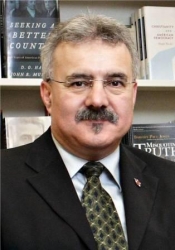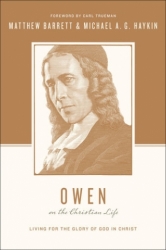Hi, I’m Fred Zaspel, editor here at Books At a Glance, and in this 500th anniversary year of the Protestant Reformation we’re interviewing various church historians to have them track the major events for us in succession, just a few minutes at a time. Today we begin talking to Dr. Michael Haykin about the French Reformation. Dr. Haykin is Professor of Church History and Historical Theology at The Southern Baptist Theological Seminary, and he is a long-time friend to us here at Books At a Glance.
Michael, welcome! It’s always great to talk to you.
Haykin:
It’s great to be here.
Zaspel:
Was there a French Reformation? Just what are we talking about here?
Haykin:
Yes. The older model of scholarship talked about The Reformation; in recent years, (and there are probably a number of reasons for this – this is certainly a trend in other areas of historical studies) in recent years, they talk about the German Reformation, the English Reformation, the Scottish Reformation, and the French Reformation, to name a few. This is paralleled in other areas as well, you know, people now talk about the French Enlightenment, not The Enlightenment – the French Enlightenment, the British Enlightenment, the American Enlightenment. You find the same kind of thing going on in patristic studies, as well. There’s emphasis on diversity rather than unity.
So, having said that, this is part of a trend, it is helpful to note that the French Reformation had different context, to some degree than, say, the German Reformation. The way it developed was different, etc. etc. So, it is helpful, I think, to talk about the French Reformation, while always bearing in mind that the French reformers that we’ll mention saw themselves as part of a pan- European movement; kind of a Reformed International, to take a term from Marxist [02:02] ideology.
Zaspel:
Who were the forerunners of the Reformation in France?
Haykin:
Well, probably the critical figure is a man named Jacques Lefevre d’Etaples. He was both a theologian, a biblical exegete, as well as a preacher. He was based, to some degree, in Paris; had access to the royal court; and played a very significant role in shaping the thinking of men like William (Guillaume) Farel, and Calvin himself. He emphasized the importance of biblical exposition in terms of taking a text, working through it verse by verse. He emphasized, also, the importance of literal exegesis; he moved away from the kind of four-fold method of exegesis that was common in the Middle Ages that saw a variety of meanings in a text; and he was very insistent on the historical/grammatical meaning. And, he, in some ways, was anticipatory of some of Luther’s teaching, and also Calvin, on justification by faith. For him, the authority of Scriptures was preeminent; and by 1512 he was preaching justification by faith alone. He comes before Luther in that regard.
Zaspel:
Were there any other figures?
Haykin:
Yes, well, he’s probably the critical figure, and he becomes the conduit for Reformation teaching coming to a variety of people. William Farel, as I said, was influenced greatly by him, and would have impact on Calvin.
Zaspel:
How did he influence the course of the Reformation? Was it mainly through Farel, and then to Calvin, or was there more?
Haykin:
Yes, there would be others – minor figures who were impacted by him, some of whom left the Roman church, some of whom did not. He would be seen as a model of what reformed piety was about, a model of biblical exposition. Also, although his sermons are not reprinted, normally, today, his sermons were seen as a model of biblical exegesis, as well. So, in a number of areas both theological and methodological, he was very helpful in laying the groundwork for people like Calvin and Farel, later.
Zaspel:
Were there any other areas of major doctrines that influenced Farel and Calvin in the Reformation? You mentioned justification by faith that he was preaching very early – was there more?
Haykin:
The big issue would be – Do you break with the Roman church? And d’Etaples did not. And so there were some who stayed within the Roman church and argued that this was quite acceptable. But, for Calvin, it was a problem. Calvin would see this as what he called “Nicodemism,” after Nicodemus, who came by night, fearful of his contemporary Pharisees. Calvin would emphasize that to stay within the Roman church was to participate in idolatrous worship, that the Mass was idolatry.
So, d’Etaples, by staying within the Roman church (he never leaves it) set a precedence here for others who would argue that they could stay within the Church of Rome and reform her from within. Calvin is convinced, eventually, that it’s not possible. D’Etaples certainly is very, very important in laying groundwork for the authority of Scripture, justification by faith, a model in terms of preaching, biblical exposition, how to interpret the Scriptures properly; but also, he raises this problem, because, by his own example, he stays within the Church and this creates problems for Calvin down the road.
Zaspel:
We’re talking to Dr. Michael Haykin, Professor of Church History at The Southern Baptist Theological Seminary and author of many books related to church history that you can check out here on our page. We hope you’ll join us next time as Dr. Haykin talks to us about the Reformer, William Farel.
Michael, many thanks for your good help.
Haykin:
Thank you.
Editor’s Note: You’ll want to check out these church history related titles from Dr. Haykin.
Books by Michael Haykin
The Advent of Evangelicalism: Exploring Historical Continuities
Amazon (Paperback)
To the Ends of the Earth: Calvin’s Missional Vision and Legacy
The Revived Puritan: The Spirituality of George Whitefield (Classics of Reformed Spirituality)
Amazon (Paperback)
The Baptist Story: From English Sect to Global Movement
The Christian Lover: The Sweetness of Love and Marriage in the Letters of Believers
Pentecostal Outpourings: Revival and the Reformed Tradition
The Reformers and Puritans as Spiritual Mentors: Hope Is Kindled (Christian Mentor)
Patrick of Ireland: His Life and Impact (Biography)
Rediscovering the Church Fathers: Who They Were and How They Shaped the Church
Eight Women of Faith
Amazon (Paperback) (Kindle) (Audiobook) (Audio CD)
Soldiers of Christ
Amazon (Paperback)
Jonathan Edwards: The Holy Spirit in Revival (Emmaus)
Amazon (Paperback)
Defence of the Truth: Contending for the Faith Yesterday and Today
Amazon (Paperback)
Ardent Love for Jesus: English Baptists and the Experience of Revival in the Long Eighteenth Century
Amazon (Paperback)
Kiffin Knollys & Keach: Rediscovering English Baptist Heritage
Amazon (Paperback)
A Cloud of Witnesses: Calvinistic Baptists in the 18th Century
Amazon (Paperback)
Bitesize Biographies: George Whitefield
Amazon (Paperback)
Devoted to the Service of the Temple: Piety, Persecution, and Ministry in the Writings of Hercules Collins (Profiles in Reformed Spirituality)
Travel with Jonathan Edwards
Amazon (Paperback)
Joy Unspeakable and Full of Glory: The Piety of Samuel and Sarah Pearce (Classics of Reformed Spirituality)
Amazon (Paperback)
A Consuming Fire: The Piety of Alexander Whyte
Baptists and War: Essays on Baptists and Military Conflict, 1640s-1990s
Amazon (Paperback) (Hardcover) (Kindle)
A Heart for Missions: Memoir of Samuel Pearce
Amazon (Paperback)
A Sweet Flame: Piety in the Letters of Jonathan Edwards (Profiles in Reformed Spirituality)
Waiting on the Spirit of Promise: The Life and Theology of Suffering of Abraham Cheare (Monographs in Baptist History)
Amazon (Paperback) (Hardcover) (Kindle)
Christ Is All: The Piety of Horatius Bonar (Profiles in Reformed Spirituality)
The Armies of the Lamb: The Spirituality of Andrew Fuller (Classics of Reformed Spirituality)
Amazon (Paperback)
To Honour God: The Spirituality of Oliver Cromwell (Classics of Reformed Spirituality)
Amazon (Paperback)
An Orthodox Catechism
The Empire of the Holy Spirit
Amazon (Kindle)
“The First Counsellor of our Denomination”: Studies in the Life and Ministry of Abraham Booth
Amazon (Kindle)
Church History 101: The Highlights of Twenty Centuries
Amazon (Paperback) (Kindle) (Audiobook) (Audio CD)
Owen on the Christian Life: Living for the Glory of God in Christ
The British Particular Baptists, Vol. 1: 1638 – 1910
Amazon (Hardcover)
The British Particular Baptists Vol. II: 1638-1910
Amazon (Hardcover)

